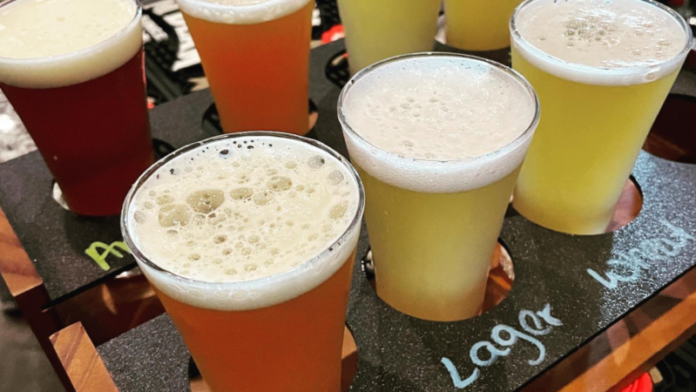With the rising popularity of home brewing and microbreweries in the 1990s and 2000s, more people have become curious about the mysteries of the beer brewing process.
At Huckleberry Brewing Company, we believe that, while beer brewing is not a simple process, it doesn’t have to be a complete mystery. It’s really a matter of the right ingredients, patience, and a little chemistry.
Let’s start with the basic ingredients. You can’t have beer without at least these four things:
- Barley (possibly oats or wheat)
- Water
- Hops
- Yeast
Then there are a few basic steps:
Malting the Barley – Some brewers start by steeping their grain to jumpstart the germination process, it’s optional depending on preference and type of beer being brewed. Whether steeped or not, germination is necessary to allow the grains to begin sprouting and activating the proteins. Then the grains are roasted (kilned) to bring out flavor and color, which will affect the final product, with a light roast producing a pale beer and a deeper roast yielding a darker, more robust beer.
Mashing In – Next, the grain is added to the Mash Tun and steeped in hot, not boiling, water for 1-2 hours to activate enzymes in the malt that will break down starches and convert them into sugars. This sugary water will then be drained from the mash, leaving a sticky, sweet liquid called wort.
Adding Hops – Now the wort will be poured into a kettle and boiled to sterilize the liquid. Hops are added in this stage to introduce bitterness; however, the timing of the addition of hops will be based on the type of beer being brewed. Altogether, the mixture will boil for 1-2 hours, after which more hops can be added for flavor, then the mixture will be cooled.
Introducing Yeast – Once cool, the liquid will be transferred to a fermentation vessel and yeast will be added, and the MAGIC will begin! Now the yeast will eat the sugars, creating carbon dioxide (the bubbles!) and alcohol. Additional hops, as well as botanicals and other flavorings can be added at this time. The length of fermentation time will be determined by the type of beer being made – shorter time at cool temps of 60-68 degrees Fahrenheit = most ales; longer time at colder temps of around 50 degrees Fahrenheit = lagers.
Filtering, Processing, Bottling – Once the beer has completed fermentation, it can be put into casks, which requires minimal processing, or it can be put into bottles, cans, or kegs, which usually needs more processing and sometimes additional carbonation. While unfiltered beer is often considered to be more “craft” because it retains more of its natural flavor, there is a fine line between minimally processing beer while still ensuring a clean beverage
Beer brewing entails a few basic ingredients and a few basic steps, but many beer drinkers will look at this process and realize that it requires far more time and energy than they want to expend just to sit down after a long day and sip a cold, foamy brew.
If that’s you, then come over and see us at Huckleberry Brewing Company. Not only will we do the brewing for you, we’ll also grill the burgers, turn on the game, and let the kids play in the game room.
See ya soon!
Huckleberry Brewing Company
600 A Frazier Dr #135, Franklin, TN 37067
(615) 721-7924




















